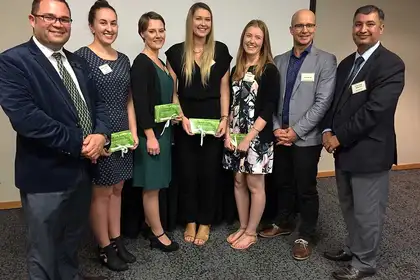
(from left) Deputy Mayor Tangi Utikere with students Hannah van Haren-Giles, Kim Wölper Kendyll Harper, Kerry Wynne; David Murphy (City Planning Manager); and Associate Professor Imran Muhammad, Planning Programme Coordinator in Massey’s School of People, Environment and Planning.
Developing affordable housing and finding solutions for conservation and hazard planning are among the special interests of four top students from Massey University’s Bachelor of Resource and Environmental Planning (BRP) programme, recently awarded prizes by the Palmerston North City Council.
A ceremony to present the awards at the Palmerston North Convention Centre during graduation week marked 28 years of collaboration between the council and the University’s planning programme.
Named after significant figures in Palmerston North’s planning history, the $1000 prizes are awarded to students with the highest overall achievement in each year of the degree. Prizes were presented by Deputy Mayor – a Massey University Bachelor of Arts alumnus – Tangi Utikere.
Mr Utikere told the audience the continuation of the awards reinforces the value that the Council places on its relationship with Massey University – in particular, with the BRP programme. He congratulated staff in offering a programme that meets the needs of both students and of local government.
“We, along with other local authorities, are very fortunate in being on the receiving end of the high calibre of graduates who are not only prepared but are also well-equipped to meet the technological, social, economic and environmental planning challenges of a changing world,” he said.
Kerry Wynne, recipient of the Bernard J Forde Planning Prize (fourth year) said she has always had an interest in the different ways people shape, and are shaped by, the world around them so studying planning was a natural choice. “Each year of the BRP I found something else that I loved, whether it was a better understanding of the natural world, or learning to unravel some of the complexity of our social systems.”
Now graduated, she recently started a new job as a Resource Consents Planner at Hutt City Council.
Kendyll Harper, recipient of the JT Stewart Planning Prize (third year) began her degree with a strong interest in agriculture and its impacts on the environment. “As my study has progressed my interests shifted towards dairying’s impact on freshwater,” she says. “This interest was encouraged by planning experience at two regional councils, in which I was fortunate enough in gaining hands-on experience in these fields.”
Her focus has since turned to urban design and planning. “Gaining work experience in this field has challenged my original view of planning, helping me to understand a wider range of planning problems. I have absolutely loved this degree and the opportunities it has provided,” she says.
Hannah van Haren-Giles, recipient of the Ken Nairn Planning Prize (second year) chose a planning degree, “because it combines my two passions of urban design and environmental sustainability.”
Her long-term goal is to apply the knowledge she has gained to design affordable, durable, and sustainable housing developments, which meet the needs of a growing New Zealand population. “I also have a strong interest in the ‘tiny house’ movement and am passionate about the growth of this concept in New Zealand and abroad.”
Kim Wölper, recipient of the David Spring Planning Prize (first year), was attracted to the interdisciplinary degree because it allows her to collaborate with people to solve environmental problems and to build well-connected, safe communities.
During the summer break she volunteered for the Maungatautari Ecological Island Trust, which introduced her to “the joys and issues around conservation planning. In the future I can see myself trying various planning fields such as conservation, hazard planning or working with farmers to make their properties more resilient to climate change while reducing environmental impacts.”
Planning for the future?
In his speech, Pro-Vice-Chancellor for the College of Humanities and Social Sciences Professor Chris Gallavin said planning is at the heart of managing the relationship between people and the environment on global, national and regional fronts.
He said that while the 21st century problems facing the planet can seem insurmountable, he felt confident the skills and values instilled in Massey’s graduates would provide solutions.
In his speech, Planning Programme Coordinator Associate Professor Imran Muhammad said he hopes the strong relationship between the University and the council will lead to the establishment of master’s and doctoral scholarships in the future. These would build on the valuable, relevant work of previous undergraduate student applied research projects, such as user’s experience of the Manawatū River shared path, and barriers to secondary school cycling in Palmerston North, as well as on housing, transport and urban design.
Post-graduate scholarships would, he said, “give us an opportunity to open up new areas and answer much bigger questions than we could do on an undergraduate student’s project and bring in resources that would be hard to justify otherwise.”